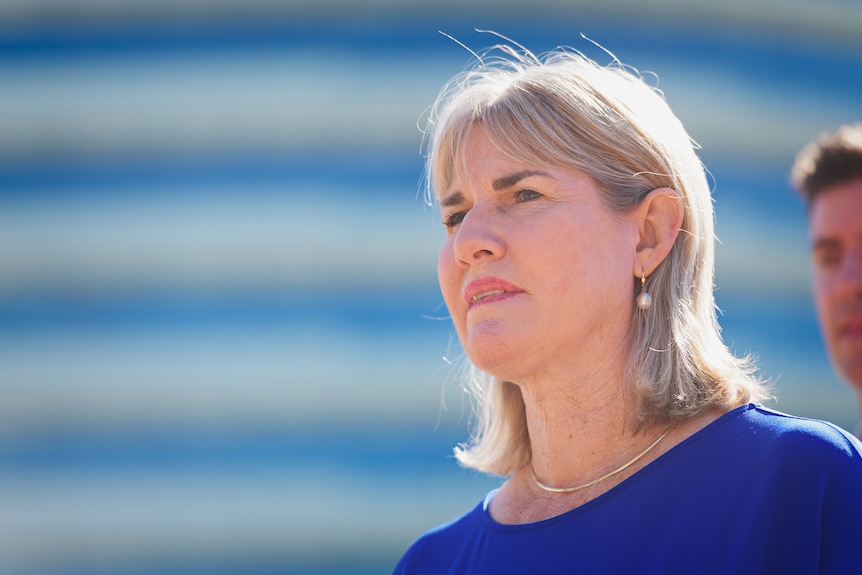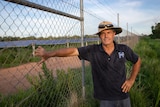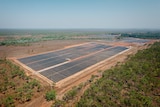Exploring the Solar Farm Acquisition Strategy in the Northern Territory
In summary, concerns over potential grid destabilization have kept four significant solar farms near Darwin and Katherine inactive. The Northern Territory government aims to address this issue by leveraging new battery projects under development to facilitate the activation of these solar farms. Additionally, there is a commitment to further expand the solar energy infrastructure in the region.
Chief Minister Eva Lawler of the Northern Territory has proposed a strategy where the government-owned Power and Water Corporation could acquire the four privately owned solar farms scattered across the Top End. This move is seen as a crucial step towards integrating these solar farms into the Northern Territory’s power network, ultimately bringing them online for effective energy utilization.
Located near Katherine and in the rural area of Darwin, these solar farms have remained disconnected from the Top End grid for over four years. Power and Water Corporation has expressed reservations about activating these facilities due to concerns about the stability and reliability of their power generation, particularly in relation to the Darwin-Katherine grid.
Addressing the potential acquisition of the solar farms, Chief Minister Eva Lawler emphasized the importance of being able to regulate the energy output from these facilities. She stated that considering the purchase of these solar farms by the Northern Territory government is indeed a viable option in the quest to enhance the region’s renewable energy capacity.

Eva Lawler has revealed that the Northern Territory (NT) government is exploring the possibility of acquiring dormant solar farms previously owned by ENI, an energy company. However, Lawler did not disclose the estimated cost associated with this potential acquisition. The proposition has drawn criticism from opposition shadow treasurer Bill Yan, who raised concerns about the prudent use of taxpayer funds for such a venture. Yan emphasized the importance of assessing the financial feasibility of such acquisitions before proceeding.
Yan further scrutinized the NT government’s approach to renewable energy initiatives, particularly highlighting the premature development of solar farms without adequate infrastructure to support them effectively. He criticized the government for what he described as “putting the cart before the horse” in its renewable energy rollout strategy. Notably, the Katherine solar farm completed construction in early 2020, marking a significant milestone in the region’s renewable energy landscape.
Reflecting on the broader renewable energy landscape in the NT, Yan pointed out that Territory Labor had awarded contracts to various companies for the construction of large-scale solar farms across the Top End. However, challenges arose when the government faced difficulties in integrating these solar farms into the existing grid due to stability issues. This situation underscored the importance of synchronizing infrastructure development with renewable energy projects to ensure seamless operations.
Alan Langworthy, the architect behind the NT’s “Roadmap to Renewables,” criticized the government’s handling of the transition to achieve 50% renewable energy by 2030. Langworthy expressed concerns about regulatory constraints hindering the timely commissioning of solar projects, deeming them “unrealistic.” These criticisms shed light on the complexities involved in transitioning to a more sustainable energy mix in the NT.
Meanwhile, as the NT government progresses with its renewable energy agenda, a $45 million “big battery” project at the Channel Island Power Station near Darwin is nearing completion. Lawler confirmed the conclusion of construction activities at the facility, signaling the commencement of the commissioning phase. This initiative aims to enhance grid stability by enabling gas generators to supplement energy supply during periods of reduced solar output caused by factors like cloud cover.
Looking ahead, the government has unveiled plans for a second phase of battery upgrades within the Top End’s “micro-grid.” This initiative involves deploying smaller batteries at strategic locations in Darwin and Katherine to bolster energy resilience further. By diversifying energy storage solutions, the government aims to fortify the region’s capacity to manage fluctuations in renewable energy generation effectively.
In summary, Eva Lawler’s announcement regarding the potential acquisition of dormant solar farms underscores the NT government’s commitment to advancing its renewable energy agenda. However, the criticisms and challenges raised by stakeholders like Bill Yan and Alan Langworthy highlight the importance of strategic planning and infrastructure readiness in facilitating a smooth transition towards a more sustainable energy future in the Northern Territory.
Discover More Stories
Challenges in Utilizing Solar Farms in the Northern Territory
The current dilemma facing solar farm acquisition strategy in the Northern Territory is the significant number of solar farms that remain inactive, failing to generate any power. This issue raises concerns about the efficiency and effectiveness of solar energy utilization in the region.

Government Expert Warns: NT Solar Investment Risks Failure
A government renewables specialist cautions that the solar farm acquisition strategy in the Northern Territory could face significant challenges.

NT Chief Minister Expresses Worries About Her Position Before the 2024 Election Showdown
The Chief Minister of the Northern Territory has recently expressed concerns about her own political future as the 2024 election approaches. This move comes amidst growing uncertainty and speculation surrounding her leadership role in the upcoming political landscape. The Chief Minister’s apprehension highlights the intense and competitive nature of the political arena as the next election draws near.

- Explore more about:


